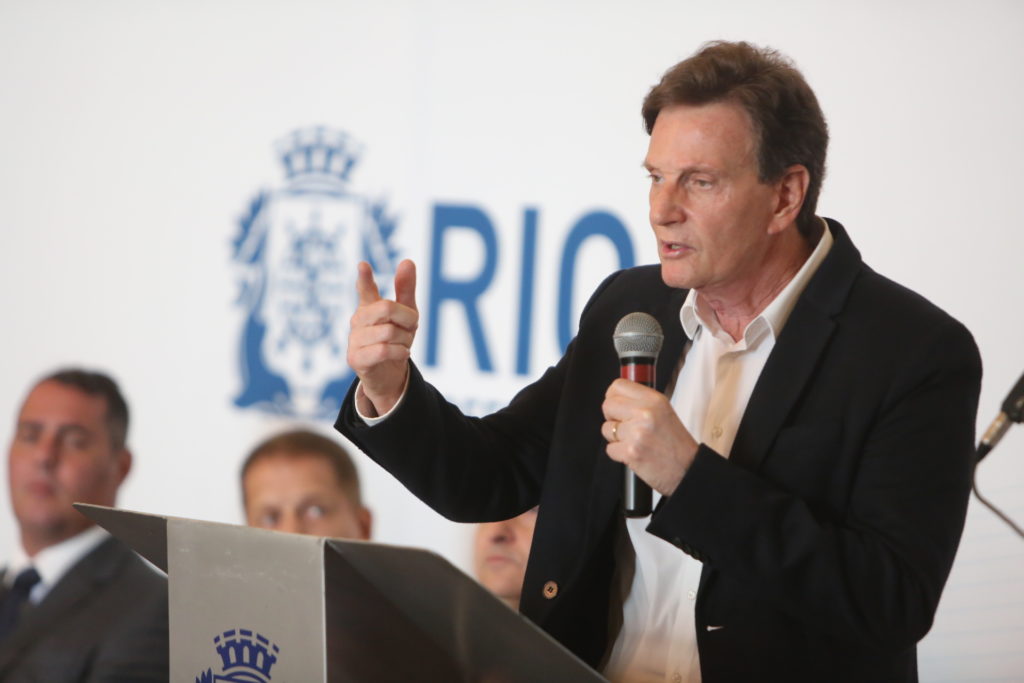RIO DE JANEIRO, BRAZIL – The Rio de Janeiro Regional Electoral Prosecutor’s Office (PRE) submitted its closing arguments in two cases against the mayor of Rio, Marcelo Crivella, and candidates for federal or state deputies, arguing for their ineligibility for public office during eight years, based on alleged abuse of power – political and religious – and “forbidden conduct” – the use of municipal assets and resources for electoral purposes.
The lawsuits concerned were filed in 2018 and relate to two events – a meeting called ‘Café da Comunhão’ (Communion Coffee) on July 4th at the City Palace and a meeting with COMLURB (Municipal Urban Cleaning Company) teams at the Estácio de Sá samba school on September 13th.
The cases have reached their final stage at the Regional Electoral Court (TRE) and are awaiting trial. They were filed by the PRE and the PSOL/PCB party coalition and name as defendants, in addition to Rio’s mayor, substitute federal deputy Rubens Teixeira (in both proceedings) and Marcelo Hodge Crivella (the mayor’s son), Raphael Leandro, and Alessandro Costa (in the coalition lawsuit).

The details were disclosed by the Federal Prosecutor’s Office in the 2nd Region.
The penalties demanded for the politicians range from an eight-year ineligibility and a fine (Crivella and Teixeira, for abuse of power, the substitute being subject to annulment of votes) to a fine of up to 100,000 UFIR (R$355,000) for politicians Marcelo Hodge Crivella and Alessandro Costa (prohibited conduct), according to the Prosecutor’s Office.
PRE lawsuit
In the proceedings against Crivella and Teixeira, the PRE argued that “there is no doubt that the two are responsible for the electoral crimes committed at the Café da Comunidade, used to launch Teixeira’s name as a pre-candidate for federal deputy.” The electoral Prosecutor’s Office cites transcripts of the mayor’s speech, who promised the attending clergy and their group a number of facilities for access to public health services, works, and presumed tax exemptions.
“It was a meeting to feed the voter base comprised of religious leaders, notoriously aligned with the mayor, to whom he offered facilities in the public administration in the name of alleged divine predestination. If only this were the context, and illegality would already be established, as no manager is granted the use of the public machine for the benefit of a specific political group, even less so when religious factors infiltrate the management,” Silvana Batini, regional electoral prosecutor, told the TRE.
“But there was more. The meeting was held on city hall premises in the pre-election period and included the pre-candidate. His presence was highlighted in the mayor’s speech, and his purported personal qualities emphasized, in the same context in which he preached the need to direct municipal public services to the strengthening of his political-religious group.”
PSOL/PCB coalition lawsuit
The lawsuit brought by the PSOL/PCB coalition contests not only practices at the Café da Comunhão but also at the Estácio de Sá meeting. It also involves other politicians besides Crivella and Teixeira: Marcelo Hodge Crivella, an unsuccessful candidate for federal deputy, and Raphael Leandro and Alessandro Costa, unsuccessful candidates for seats in ALERJ (Rio de Janeiro Legislative Assembly).
At the event, to which COMLURB employees and outsourced workers were invited and carried in company vehicles, the PRE considered that there was sufficient evidence to convict them of prohibited conduct, except for Raphael Leandro, whose attendance at those political events could not be confirmed.
Rio Mayor’s defense
Both lawsuits concern the 2018 elections, in which Mayor Crivella was not even a candidate. They relate to two meetings that occurred strictly within the framework of the Law and that both the Rio de Janeiro City Council and the STF have decided there was no irregularity in either.
According to defense counsel, full legal evidence contain the information that rules out the unjustifiable request for ineligibility, or any sanction, which was based on a mere inference and disproportionate punitive assumption inapplicable to the case.
Source: Estadão Conteúdo

